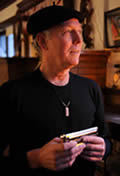
“Jumpin’ Gene” Halton plays harmonica, or “harp,” as it is known in the blues world, with his group, Off-the-Wall Blues Band, and acoustic duo, The Dillon Brothers. His alter ego, Professor Eugene W. Halton, teaches sociology at Notre Dame. In the past, Halton has combined his two identities, teaching the sociology course Blues and American Culture. This fall he will again use the blues as a window to examine American social history for a segment of his course on The Materialization of America, which, among other things, will deal with the rise of consumer culture. His new book, The Great Brain Suck: And Other American Epiphanies, focuses on many of these themes. In the brief interview here, we ask him what’s so special about the blues.
CompeNDium: You’re a student of the blues on many levels, playing it and using it in your courses; what have you learned and what do you teach from the blues?
Halton: From a social history standpoint, the blues chronicles the harsh conditions African Americans have had to deal with, extending from at least the 1880s when the levees were being built in the Mississippi delta by ex-slaves through the great migration north to the urban manufacturing centers, and all the racism and sheer violence they had to contend with along the way. What poured out from all that in the music is a whole wide palette of emotions.
On a personal level, the blues is about intensity of feeling. It’s the opposite of so much in pop culture today. Listen to the stories in a good blues song and they put you in touch with real, intense life.
It’s a mistake to think the blues are all “misery songs.” You might be down and so sing about life, love, women, a joyful kind of tune. You might need the joy of the music because you have the blues. The literal meaning is that you are down, that life is tough, but music is the way to transcend that. Those are some good lessons.
To hear the blues performed by Jumpin’ Gene go to www.nd.edu/~ehalton/Livesamples.html.
Photo of Gene Halton by Matt Cashore.